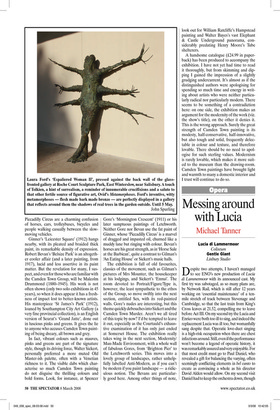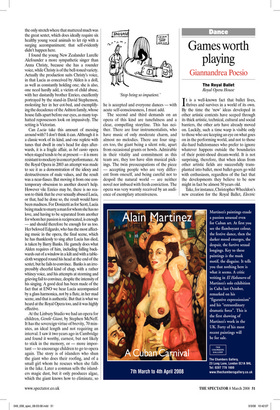Messing around with Lucia
Michael Tanner
Lucia di Lammermoor Coliseum Gentle Giant Linbury Studio
Despite two attempts, I haven’t managed to see ENO’s new production of Lucia di Lammermoor with its announced cast. My first try was sabotaged, as so many plans are, by Network Rail, which is still after 12 years working on ‘essential maintenance’ of a tenmile stretch of track between Stevenage and Cambridge, so that the last train from King’s Cross leaves at 21.52, compelling me to leave before Act III. On my second try the Lucia and Enrico were both too ill to sing, and indeed the replacement Lucia was ill too, but womanfully sang despite that. Operatic love-duet singing is a high-risk occupation when there are chest infections around. Still, even if the performance won’t become a legend of operatic history, it was remarkably assured and very enjoyable. For that most credit must go to Paul Daniel, who revealed a gift for balancing the varying, often seemingly conflicting elements in bel canto to create as convincing a whole as his director David Alden would allow. On my second visit Daniel had to keep the orchestra down, though the only stretch where that mattered much was the great sextet, which does ideally require six healthy young vocal animals to let rip with a surging accompaniment; that self-evidently didn’t happen here.
I found the young New Zealander Lurelle Alefounder a more sympathetic singer than Anna Christy, because she has a rounder voice, while Christy is of the bell-toned variety. Actually the production suits Christy’s voice, in that Lucia as conceived by Alden is a doll, as well as constantly holding one; she is also, one need hardly add, a victim of child abuse, with her dastardly brother Enrico, excellently portrayed by the stand-in David Stephenson, molesting her in her cot-bed, and exemplifying the decadence of the Ashton family, whose house falls apart before our eyes, as many tophatted repossessors look on impassively. The setting is Victorian.
Can Lucia take this amount of messing around with? I don’t think it can. Although it is a classic work of its kind, and one replete with tunes that dwell in one’s head for days afterwards, it is a fragile affair, as bel canto opera when staged tends to be at present — it is more resistant to mockery in concert performance. At the Royal Opera in 2003 an attempt was made to see it as a demonstration of the idiocy and destructiveness of male values, and the result was a near-fiasco. But moving it from one contemporary obsession to another doesn’t help. However vile Enrico may be, there is no reason to think that he ever sexually abused Lucia, or that, had he done so, the result would have been madness. For Donizetti as for Scott, Lucia being made to marry a man for whom she has no love, and having to be separated from another for whom her passion is reciprocated, is enough — and should therefore be enough for us too. Her beloved Edgardo, who has the most affecting music in the opera, the final scene, which he has thanklessly to sing after Lucia has died, is taken by Barry Banks. He gamely does what Alden requires of him, including falling backwards out of a window in a kilt and with a tablecloth wrapped round his head at the end of the sextet, but he fails to convince. Banks is an irrepressibly cheerful kind of chap, with a rather whiney voice, and his attempts at storming and grieving fail to convince, despite the intensity of his singing. A good deal has been made of the fact that at ENO we hear Lucia accompanied by a glass harmonica, not by a flute, in her mad scene, and that is authentic. But that is what we heard at the Royal Opera too, and it was highly effective.
At the Linbury Studio we had an opera for children, Gentle Giant, by Stephen McNeff. It has the sovereign virtue of brevity, 70 minutes, an ideal length and not requiring an interval. I saw it two years ago in Cambridge and found it worthy, earnest, but not likely to stick in the memory, or — more important — to encourage children to go to opera again. The story is of islanders who shun the giant who does their roofing, and of a small girl whom he rescues when she falls in the lake. Later a conman sells the islanders magic dust, but it only produces algae, which the giant knows how to eliminate, so he is accepted and everyone dances — with acute self-consciousness, I must add.
The second and third demands on an opera of this kind are tunefulness and a clear, compelling storyline. This has neither. There are four instrumentalists, who have music of only moderate charm, and almost no melodies. There are four singers too, the giant being a silent role, apart from occasional grunts or howls. Admirable in their vitality and commitment as this team are, they too have slim musical pickings. The twin preoccupations of the piece — accepting people who are very different from oneself, and being careful not to despoil the natural world — are neither novel nor imbued with fresh conviction. The opera was very wamly received by an audi ChambersGalleryhalfdoubSpec 28 ence of exemplary attentiveness.



















































































 Previous page
Previous page